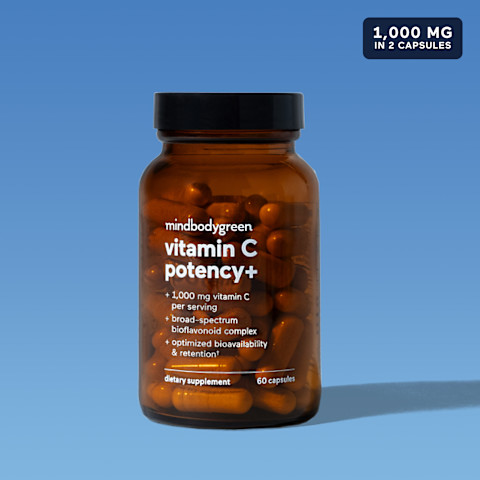Supplement Or Serum? How Vitamin C Supports Skin Health In All Forms*

Vitamin C has built up a reputation for being a powerful antioxidant that is absolutely essential for a healthy immune system1.* But many people miss the fact that the vitamin has plenty of skin benefits, too.*
Research has found that almost half of American adults2 aren't meeting the National Academies' recommended daily dosage of at least 75 to 90 milligrams of vitamin C3 (for women and men, respectively), and in addition to that surprising stat, here's another: Approximately 42% of the U.S. adult population4 has insufficient vitamin C blood levels (aka vitamin C insufficiency).
If you're one of them, you could be doing your body—and your skin—a serious disservice by not having enough vitamin C in your life.*
Of course, there are different ways for your skin to get its vitamin C fix, and there's merit to consuming and topically applying the essential vitamin. In a perfect world, though, experts say you'd get a mix of both to support optimal skin health.* Here's what you need to know.
How can a vitamin C supplement support skin health?
Vitamin C is required for the biosynthesis of collagen, which is one of the main building blocks for your skin (along with your hair, muscles, tendons, bones, blood vessels, gut, and more), and research continues to grow5 in this area.* In other words, this is a seriously important whole-body protein and nutrient pairing.
"Oral vitamin C through supplements and diet is crucial for collagen production," says Ife J. Rodney, M.D., founding director of Eternal Dermatology + Aesthetics in Maryland, as "this results in firm, youthful skin."* Vitamin C is also crucial for skin barrier protection and healing, Rodney explains.*
If you have a few days without enough vitamin C, "you likely won't notice a big difference," says Jessica Cording, R.D., CDN, registered dietitian and mbg Collective member. But, if you're chronically low in vitamin C, your skin may look more wrinkled6, dry, and dull than usual, she says.
Over time, getting enough vitamin C daily and maintaining sufficient levels can even help manage oil production and enhance overall skin clarity7.*
How your topical and oral vitamin C can work together
Dermatologists say that using a topical vitamin C product is an excellent way to treat your skin well.
"Vitamin C is perhaps the best-studied topically applied antioxidant we have to support the skin," notes Joshua Zeichner, M.D., director of cosmetic and clinical research in dermatology at Mount Sinai Hospital in New York. "It protects the skin against free radicals, blocks the production of abnormal pigmentation, and acts as a cofactor for the production of new collagen."
Vitamin C serums are usually used to brighten skin, even skin tone, and provide protection against oxidative stress, he says.
The antioxidants in vitamin C "scavenge and fight free radicals that impair DNA and speed up the signs of aging,"* Rodney explains. Topical vitamin C even helps "enhance the power of your sunscreen, creating an added antioxidant barrier," she adds.
While you could use a topical product or supplement, it's really best to leverage the benefits of vitamin C for your skin internally and externally, says Gary Goldenberg, M.D., of New York's Goldenberg Dermatology.*
"I recommend oral and topical vitamin C to clients," he says. "Oral vitamin C is important to overall health…topical vitamin C is an important antioxidant for skin health."* When used together, these two "improve skin appearance and function,"* he explains.
Rodney agrees. "It's important to get the daily recommended value orally through diet and supplements," she notes. "Oral vitamin C ensures the long-term health of your skin."*
But, she says, if you have an immediate skin need, a vitamin C serum can help quickly. "For the best results, I recommend using both oral and topical vitamin C," Rodney says.
What to look for in a vitamin C supplement for skin
Sure, you can get your recommended daily dose of vitamin C in your diet, but many people don't. "If someone has a hard time meeting their vitamin C needs through food, a supplement can help address that gap in the diet," Cording says.
"As a beauty expert, it's important for my skin and my client's skin to be in its optimal state. Our skin is a reflection of what's happening inside our body, and antioxidant nutrients are pivotal to this inside-out beauty approach,"* explains celebrity hairstylist, makeup artist, and licensed medical esthetician Tiffany Lee.
If you're going to take a vitamin C supplement, you'll want to make sure it's helping you meet those needs. A high-quality supplement that's specially designed to maximize bioavailability and cellular retention (hello, skin cells) and elevate whole-body antioxidant activity is ideal.*
The way in which you get your vitamin C is important, too, Cording says: You'll want to steer clear of those in gummy form, which have added sugars your body doesn't need (plus, colorants, flavors, calories, etc.). You get the picture.
Consumed orally, vitamin C has a proven high safety profile with a low risk for toxicity8—meaning, side effects are rare and it's difficult to have too much of it. Keep in mind, per Cording, that because vitamin C is a water-soluble vitamin, you'll excrete whatever your body doesn't need through your urine.
Having a high-potency supplement with optimized absorption (plus the incremental benefits of an array of citrus bioflavonoids from 100% whole citrus fruits) is a great way to ensure you'll meet your needs and support optimal skin health.*
"As an essential water-soluble vitamin, I highly recommend mbg's vitamin C potency+ for its powerhouse antioxidant support to protect our skin from the environment, promote healthy aging, and enable optimal healing. With the advanced potency, bioavailability, and bioefficacy of this formula—your skin and entire body benefit,"* says Lee.
The takeaway
Proper levels of vitamin C are crucial for promoting healthy skin, along with so many other areas of your overall health.* Experts recommend taking advantage of oral and topical vitamin C to support your skin from the inside out and outside in.*
8 Sources
- https://www.ncbi.nlm.nih.gov/labs/pmc/articles/PMC5707683/
- https://www.ncbi.nlm.nih.gov/labs/pmc/articles/PMC7352522/
- https://www.ncbi.nlm.nih.gov/books/NBK225480/
- https://www.mdpi.com/2072-6643/13/11/3910/htm
- https://www.ncbi.nlm.nih.gov/labs/pmc/articles/PMC5579659/
- https://academic.oup.com/ajcn/article/86/4/1225/4649573?login=false
- https://www.ncbi.nlm.nih.gov/labs/pmc/articles/PMC3673383/
- https://ods.od.nih.gov/factsheets/VitaminC-HealthProfessional/

